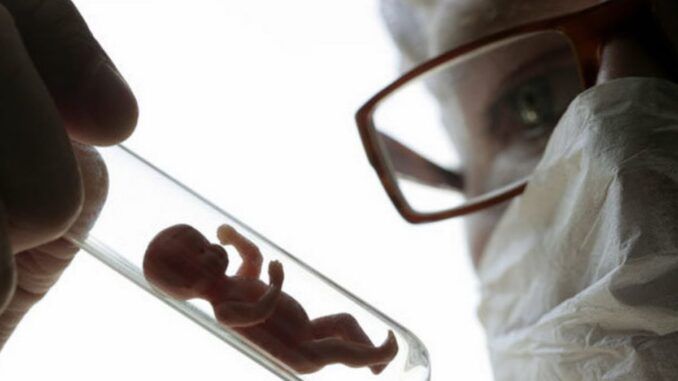
Scientists in Israel have created the world’s first lab-grown “synthetic embryo” in a breakthrough which has taken science one step closer to creating babies without biological parents, or even fertilized eggs or a uterus.
Led by molecular geneticist Joseph Hanna, a team of researchers at Israel’s Wizemann Institute of Science managed to create the synthetic mouse “embryo” in a lab, taking them one step closer to their goal of developing synthetic human stem cells in an attempt to solve human health crises.
The research raises serious ethical concerns, with critics warning babies will be created for “spare parts,” or even worse, the sexual gratification of adults.

BYPASS THE CENSORS
Sign up to get unfiltered news delivered straight to your inbox.
You can unsubscribe any time. By subscribing you agree to our Terms of Use
This new embryo model, as detailed in the paper published this week in the medical journal Cell, was able to mimic all the features of an early body, “including precursors of heart, blood, brain and other organs” as well as “the ‘support’ cells like those found in the placenta and other tissues required to establish and maintain a pregnancy, as University of Melbourne stem cell researcher Megan Munsie wrote in a piece for The Conversation.
The research could have major implications beyond the obvious ethical concerns. “This is a crucial stage: in humans, many pregnancies are lost around this stage, and we don’t really know why,” Munsie wrote. “Having models provides a way to better understand what can go wrong, and possibly insights into what we may be able to do about it.”
The embryo model, however, only survived eight out of the 20-day mouse embryonic cycle, a critical drawback that, given the stated goal of Renewal Bio, the company founded by Hanna to commercially fund this research.
The startup’s goal is to develop synthetic human stem cells in an attempt to “solve” human health crises, a science which experts say won’t be ready for decades. In short, Bio Renewal wants to create embryo-stage versions of humans so that it can harvest tissues for transplants.
Critics who spoke with MIT Technology Review said that it wasn’t time to talk about the creation of synthetic human embryos, especially given the greater political context and controversy surrounding the research. “It’s absolutely not necessary,” Nicolas Rivron, a stem-cell scientist at Vienna’s Institute of Molecular Biotechnology, told the magazine, “so why would you do it?”

